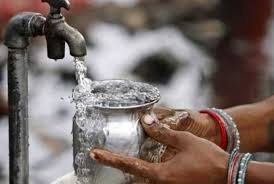The Annual Action Plan of Arunachal Pradesh to achieve 100% household tap connections in the State was approved by National Jal Jeevan Mission, Ministry of Jal Shakti. The State proposed to provide 100% tap connections to all the households by March, 2023. Govt of India approved Rs 255 Crore for the State under Jal Jeevan Mission (JJM) in 2020-21. States are given additional funds in form of performance grants based on their achievement in terms of tangible outputs i.e. the household tap connections and commensurate financial progress. Out of 2.18 lakh total rural households, the State is planning to provide 77,000 tap connections in 2020-21. While planning, thrust is given on covering households in aspirational district, quality-affected habitations, Sansad Adarsh Gramin Yojna villages, etc. on priority.
Water availability in Arunachal Pradesh is not an issue, but the challenges faced in implementation are the tough mountainous terrain, sparsely located habitations and the harsh climatic conditions. However, the State Govt has charted a well thought of plan to cover all villages/ habitations so as potable water reaches every rural household. Jal Jeevan Mission does provide a golden opportunity to the State to provide clean, potable water to its citizens in their houses, so that the burden of women and girls is lessened.
The state is targeting the ‘low-hanging fruits’ i.e. in the villages/ habitations where piped water supply schemes already exist, so that remaining households could be provided with tap connections easily in least possible time. The State plans to immediately provide tap connections to all remaining households belonging to weaker sections of the society on priority. During the Covid–19 pandemic, it’s the endeavour of Government that people don’t crowd public stand posts/ drinking water sources. State was advised for taking up water supply works in villages on immediate basis to provide household tap connections, which will help in practicing social distancing, and will additionally help local people in getting employment and boost rural economy.
A clear roadmap has been prepared for the effective implementation of Village Action Plan (VAP) with the active participation of the rural community. Local community will play a pivotal role in planning, implementation, management, operation and maintenance of water supply systems in villages to ensure long-term sustainability. Local communities are encouraged to take responsibility of water supply systems in villages for regular upkeep and operation and maintenance. Skilling activities are planned so that unemployed youth could be trained in plumbing, masonry, fitting, electricity, etc. so that a pool of trained Human resources could be available at village level and could be engaged locally.
Strengthening of existing drinking water sources for long-term sustainability of drinking water supply systems through convergence of various programmes like MGNREGS, SBM (G), 15th FC Grants to PRIs, District Mineral Development Fund, CAMPA, Local Area Development Fund, etc. at village level is planned for judicious use of all available funds. The State has been allocated Rs. 231 Crore under 15th Finance Commission Grants to PRIs during 2020-21; 50% of this amount has to be mandatorily to be spent on water and sanitation.
Under Jal Jeevan Mission, water quality testing laboratories at district & state levels are given priority. Community is being involved for surveillance of water quality. Provision has been made to empower and engage with the community, for which action plan is prepared to incorporate the various planned activities like timely procurement of kits, supply of kits to the community, identification of at least five women in every village, training women for use of Field Test Kits.
The Prime Minister Shri Narendra Modi had announced Jal Jeevan Mission on 15th August, 2019 with the objective to provide functional household tap connections to every rural household of the country by 2024. Being implemented in partnership with States, the Mission aims to enable every rural household has assured availability of potable water at a service level of 55 litres per capita per day (lpcd) on regular and long-term basis so as to bring improvements in lives of rural folks.





